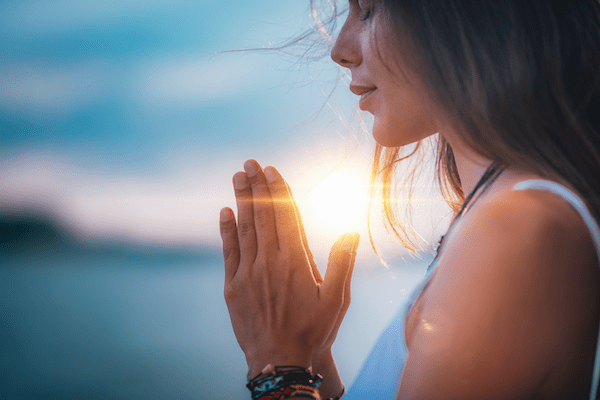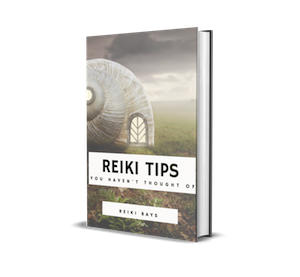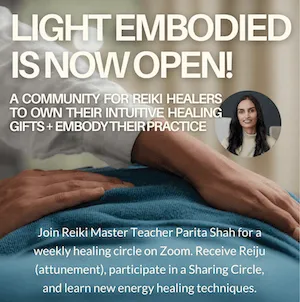When I started my Reiki journey, I wanted to get everything exactly right. In time, however, I realized that the “mistakes” I was so afraid of making allowed me to deepen my understanding of the Reiki system. As the Dive Into Reiki podcast host, I ask every interviewee about their biggest “oops.” Here are seven of them:
- Not practicing every day: It sounds obvious, but this is the single, most common mistake we make when it comes to Reiki practice. Our schedules get busy. We start skipping a day here and there. We try to recoup by doing a workshop or a more extended practice every so often. Slowly our commitment to practicing weakens. Reiki practice is like sleep; you can’t recoup what you have not practiced. It’s better to practice 5 to 10 minutes every day than one hour sporadically. Keep it simple: meditate with the precepts or do one hand position fully present. Expand it on the days when your schedule is lighter.
- Offering Reiki only to others: In my first Reiki 1 training, I wasn’t even taught a self-care protocol. Nor was I in my second training. As a teacher, I’ve had students telling me they heard Reiki practice is only for others and that they should not practice on themselves. Self-practice is the core of Reiki practice. By compassionately holding space for our feelings of anger and worry, we release them. We feel energized; become more centered and hold the space for others from a peaceful, luminous place.
- Trying too hard: We all have felt it at one point: the desire for the other person (or ourselves) “to feel” the session. For the session “to work.” We harden our focus and add rituals, tools, and breathwork. However, trying too hard tenses the body. Expectations get in the way. And the energy doesn’t flow the way it should. By letting go, our body and mind relax, and the energy flows freely. If we’ve done our daily practice diligently and approached the session without attachment to results, we did everything we needed to do for the healing to occur. The rest is not in our hands (literally!).

- Not being accountable: One of the first Reiki teachings is that energy will flow where needed and do its thing. We are not the ones doing the healing. However, that doesn’t mean we should not bring our best selves into the equation. Do our inner work, communicate responsibly, stay focused during sessions, and respect the essence of the system and its rituals. It’s not about being perfect but being accountable as a practitioner versus sometimes getting sloppy and relying on external forces or beings to “fix it.”
- Getting distracted by sensations: Sensations like heat, tingling, or colors during sessions (called Hibiki in Japanese) are meant to guide our hands. Nothing more. There is nothing to understand, nothing to analyze. Observe the sensations, follow their guidance for hand placement, let the energy flow, and let the sensations go. “Through the sensation of ki, the Japanese seem to have grasped the essence of natural phenomena without trying to explain them,” explains Kenji Tokitsu his book Ki and the Way of Martial Arts. Energy follows the mind, which means that if we are analyzing sensations during a session, the energy is not fully flowing to the client—some of it is stuck in our heads as we examine them.
- Thinking more trainings will give you more “Reiki power”: Although more initiations or attunements can provide a temporary boost in energy flow, their real purpose is to help us remember our true essence—not increase power. They are like a nudge to push us forward. Consistent practice allows us to deepen our understanding, release the layers of anger and worry that obscure our inner light, and enable more energy to flow consistently.
- Being too hard on yourself: Reiki practice will bring you many gifts: acceptance, gratitude, compassion, and joy. But it is no guarantee of a perfect life in which we are always happy. Life will always have its challenges—as we have seen these past few years. Don’t be hard on yourself and think your practice is failing you if you feel sad, angry, or scared. It’s ok to have these uncomfortable feelings. We are human. The idea is to use our practice to sit with our emotions, accept them and process them. This is what makes us grow into better human beings.
Any “oops” of your own? Drop them in the comment section!
Article by Nathalie Jaspar
Free eBook download: We’ve created an eBook with our best articles on this topic, and offer it for free to all our newsletter subscribers.


Nathalie Jaspar
Nathalie Jaspar is a Reiki master with over 15 years of practice. Her mission is to deepen the understanding of Reiki practice in the world. She is a graduate teacher from the International House of Reiki, also trained with the Center for True Health, and the International Center for Reiki. To gain an even deeper understanding of Reiki practice, Nathalie went to Japan to practice Zen Buddhism at the Chokai-san International Zendo. Nathalie is the author of Reiki as a Spiritual Practice: an Illustrated Guide, and the Reiki Healing Handbook. She is the host of the Dive Into Reiki podcast and has been invited to demonstrate Reiki practice at venues such as Soho House, the New York Jet’s Athletic Center, and Fashion Week.
You can reach her via www.diveintoreiki.com, or https://www.facebook.com/Dive-Into-Reiki/





Thank you very much for the kindness to share your experience with us!!!
Love n Light to you:)
My pleasure. Thank you for commenting. Sending love and light, Nathalie
Gratitude Nathalie.🙏
You have explained it in a very simple way.
Same I follow.
Thankful to you ❤️
Love and Light to you ❤️